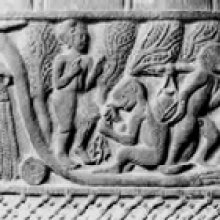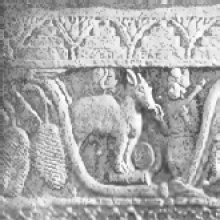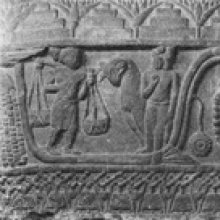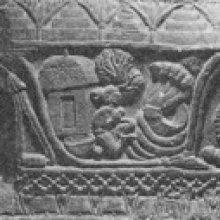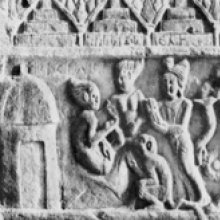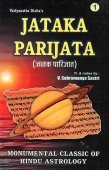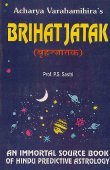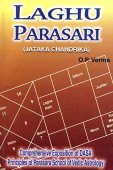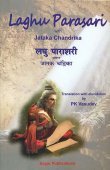Jataka, Jātaka: 25 definitions
Introduction:
Jataka means something in Buddhism, Pali, Hinduism, Sanskrit, the history of ancient India, Marathi, Hindi. If you want to know the exact meaning, history, etymology or English translation of this term then check out the descriptions on this page. Add your comment or reference to a book if you want to contribute to this summary article.
Alternative spellings of this word include Jatak.
Images (photo gallery)
(+54 more images available)
In Hinduism
Jyotisha (astronomy and astrology)
Source: Google Books: Studies in the History of the Exact Sciences (Astronomy)Jātaka (जातक) refers to “genethlialogy” (i.e., the science of astrology).—Cf. Yavanajātaka (lit. “Greek Genethlialogy”): the first Sanskrit text which describes Greek astrology in a systematic way.—The original text (now lost in Greek) was first translated into Sanskrit prose in A.D. 149/150 and it was versified in A.D. 269/270 by one Sphujidhvaja. The prose version is no longer extant. Sphujidhvaja enumerates seven planets on many occasions, but it is only toward the end of the work (chapter 77) that the weekday order is attested. This order does not seem to have been widespread in that period in India. Neither Rāhu nor Ketu appears in the Yavanajātaka.
Source: Wikibooks (hi): Sanskrit Technical TermsJātaka (जातक).—Genethlialogy; the practice or study of casting nativity horoscopes. Note: Jātaka is a Sanskrit technical term used in ancient Indian sciences such as Astronomy, Mathematics and Geometry.

Jyotisha (ज्योतिष, jyotiṣa or jyotish) refers to ‘astronomy’ or “Vedic astrology” and represents the fifth of the six Vedangas (additional sciences to be studied along with the Vedas). Jyotisha concerns itself with the study and prediction of the movements of celestial bodies, in order to calculate the auspicious time for rituals and ceremonies.
Purana and Itihasa (epic history)
Source: archive.org: Shiva Purana - English TranslationJātaka (जातक) refers to “one’s horoscope”, according to the Śivapurāṇa 2.3.8.—Accordingly, as Himavat said to Sage Nārada:—“O sage Nārada, of good knowledge, O lord, foremost among the sons of Brahmā, you are omniscient. You are sympathetic. You are engaged in rendering help to others. Please read the horoscope of my daughter [i.e., sutā-jātaka] and tell me about her good and bad fortune. Whose beloved wife will my fortunate daughter be?”.

The Purana (पुराण, purāṇas) refers to Sanskrit literature preserving ancient India’s vast cultural history, including historical legends, religious ceremonies, various arts and sciences. The eighteen mahapuranas total over 400,000 shlokas (metrical couplets) and date to at least several centuries BCE.
General definition (in Hinduism)
Source: WikiPedia: HinduismJātaka (जातक): The Jataka is a voluminous body of folklore and mythic literature, primarily associated with the Theravada Buddhist tradition, as written in the Pali language (from about the 3rd century, C.E.); The story of Rama is told in one of Jātakas.
In Buddhism
Theravada (major branch of Buddhism)
Source: Pali Kanon: Pali Proper NamesThe tenth book of Khuddaka Nikaya of the Sutta Pitaka containing tales of the former births of the Buddha. The Jataka also forms one of the nine angas or divisions of the Buddhas teachings, grouped according to the subject matter (DA.i.15, 24).
The canonical book of the Jatakas (so far unpublished) contains only the verses, but it is almost certain that from the first there must have been handed down an oral commentary giving the stories in prose. This commentary later developed into the Jatakatthakatha.
Some of the Jatakas have been included in a separate compilation, called the Cariya Pitaka. It is not possible to say when the Jatakas in their present form came into existence nor how many of these were among the original number. In the time of the Culla Niddesa, there seem to have been five hundred Jatakas, because reference is made to pancajatakasatani (p.80; five hundred was the number seen by Fa Hsien in Ceylon (p.71)). Bas reliefs of the third century have been found illustrating a number of Jataka stories, and they presuppose the existence of a prose collection. Several Jatakas exist in the canonical books which are not included in the Jataka collection. For a discussion on the Jatakas in all their aspects, see Rhys Davids Buddhist India, pp.189ff.
The Dighabhanakas included the Jataka in the Abhidhamma Pitaka. (DA.i.15; the Samantapasadika (i.251) contains a reference to a Jatakanikaya).
The Jataka consists of twenty two sections or nipatas.
Source: Dhamma Dana: Pali English GlossaryN Chronicles of Buddhas past lives.
Theravāda is a major branch of Buddhism having the the Pali canon (tipitaka) as their canonical literature, which includes the vinaya-pitaka (monastic rules), the sutta-pitaka (Buddhist sermons) and the abhidhamma-pitaka (philosophy and psychology).
General definition (in Buddhism)
Source: Wisdom Library: Dharma-samgrahaJātaka (जातक, “birth-story”) refers to one of the “nine (types of) teachings” (sūtra) as defined in the Dharma-saṃgraha (section 62). The Dharma-samgraha (Dharmasangraha) is an extensive glossary of Buddhist technical terms in Sanskrit (e.g., jātaka). The work is attributed to Nagarjuna who lived around the 2nd century A.D.
Source: Buddhist Door: GlossaryThe sutra to narrate the birth stories of Shakyamuni in present life, past lives, and effects related to the past lives and the present lives.India history and geography
Source: Cologne Digital Sanskrit Dictionaries: Indian Epigraphical GlossaryJātaka.—(LL), Buddhist; birth-story [of one who is to be a Buddha in a future life]; story of a previous birth of Gautama Buddha. Note: jātaka is defined in the “Indian epigraphical glossary” as it can be found on ancient inscriptions commonly written in Sanskrit, Prakrit or Dravidian languages.

The history of India traces the identification of countries, villages, towns and other regions of India, as well as mythology, zoology, royal dynasties, rulers, tribes, local festivities and traditions and regional languages. Ancient India enjoyed religious freedom and encourages the path of Dharma, a concept common to Buddhism, Hinduism, and Jainism.
Languages of India and abroad
Pali-English dictionary
Source: BuddhaSasana: Concise Pali-English Dictionaryjātaka : (nt.) a birth story. (adj.), born; arisen.
Source: Sutta: The Pali Text Society's Pali-English Dictionary1) Jātaka, 2 (m.) (jāta+ka, belonging to what has been born) a son J. I, 239; IV, 138. (Page 281)
2) Jātaka, 1 (nt.) (jāta+ka, belonging to, connected with what has happened) 1. a birth story as found in the earlier books. This is always the story of a previous birth of the Buddha as a wise man of old. In this sense it occurs as the name of one of the 9 categories or varieties of literary composition (M. I, 133; A. II, 7, 103, 108; Vin. III, 8; Pug. 43. See navaṅga). -2. the story of any previous birth of the Buddha, esp. as an animal. In this sense the word is not found in the 4 Nikāyas, but it occurs on the Bharhut Tope (say, end of 3rd cent. B. C.), and is frequent in the Jātaka book. ‹-› 3. the name of a book in the Pāli canon, containing the verses of 547 such stories. The text of this book has not yet been edited. See Rh. Davids’Buddhist India, 189—209, and Buddh. Birth Stories, introd. , for history of the Jātaka literature.—jātakaṃ niṭṭhapeti to wind up a Jātaka tale J. VI, 363; jātakaṃ samodhāneti to apply a Jātaka to the incident J. I, 106; DhA. I, 82. ‹-› Note. The form jāta in the sense of jātaka occurs at DhA. I, 34.

Pali is the language of the Tipiṭaka, which is the sacred canon of Theravāda Buddhism and contains much of the Buddha’s speech. Closeley related to Sanskrit, both languages are used interchangeably between religions.
Marathi-English dictionary
Source: DDSA: The Molesworth Marathi and English Dictionaryjātaka (जातक).—n (S) The predetermination, from the horoscope &c., of the fortunes and destinies of an individual through life: also that branch of astrology which teaches the calculation. 2 A particular one of the eight varga or significant letters considered in forming a matrimonial connection.
Source: DDSA: The Aryabhusan school dictionary, Marathi-Englishjātaka (जातक).—n Astrological calculation of a nativity.
Marathi is an Indo-European language having over 70 million native speakers people in (predominantly) Maharashtra India. Marathi, like many other Indo-Aryan languages, evolved from early forms of Prakrit, which itself is a subset of Sanskrit, one of the most ancient languages of the world.
Sanskrit dictionary
Source: DDSA: The practical Sanskrit-English dictionaryJātaka (जातक).—a. [jāta-svārthe ka] Born, produced.
-kaḥ 1 A new-born infant.
2) A mendicant.
-kam 1 A ceremony performed after the birth of a child (jātakarman); जात- काद्याः क्रियाश्चास्या विधिपूर्वं यथाक्रमम् (jāta- kādyāḥ kriyāścāsyā vidhipūrvaṃ yathākramam) Mahābhārata (Bombay) 1.8.12; जातकं कारयामास वर्तयित्वा च मङ्गलम् (jātakaṃ kārayāmāsa vartayitvā ca maṅgalam) Bhāgavata 1.12.13.
2) Astrological calculation of a nativity.
3) An aggregate of similar things.
Source: Cologne Digital Sanskrit Dictionaries: Edgerton Buddhist Hybrid Sanskrit DictionaryJātaka (जातक).—nt., rarely m., (1) m. pl., experiences in past births, particularly of Bodhisattvas: Bodhisattvabhūmi 67.17 (sa tena pūrve-)nivāsānusmṛtijñānena jātakān pūrvāṃ bodhisat- tvacaryā-paramādbhutacaryāṃ sattvānāṃ buddhe… prasādajananārthaṃ…prakāśayati, by this knowledge consisting of remembrance of former births he reveals to creatures, in order to make them well-disposed to the Buddha, his experiences in past births etc.; 397.13 (pūrvenivāsā- nusmṛtijñānabalena tathāgataḥ pūrvānte itivṛttakāṃś) ca jātakāṃś ca smṛtvā…vineyānāṃ deśayati; this [Page240-b+ 71] usage, which is probably only a late and secondary extension of the next meaning, seems not recorded in Pali; (2) nt., = Pali id., a story of a previous birth of the Buddha, common especially in colophons to many such stories in Mahāvastu, e.g. i.282.13; also as name of a work or type of literature, sometimes, at least, referring to a specific collection of such stories like the Pali Jātaka (Pali): as one of the nine (Mahāvyutpatti twelve) pravacana, gospel texts (Mahāvyutpatti dharma-pra°), Dharmasaṃgraha 62; Mahāvyutpatti 1275; in a similar list, Saddharmapuṇḍarīka 45.7; Jātake Śyāmākajātakaprabhṛtiṣu Karmavibhaṅga (and Karmavibhaṅgopadeśa) 50.6, in the Jātaka (collection), in the Śyāmāka (individual) Jātaka and others like it, combining both these mgs. in one phrase; (3) in Mahāvastu i.104.13; 105.5, 7; 192.19 taken by Senart in sense 2 above, but I think wrongly; I believe it means nativity in the sense of (astrologically determinable) personality and destiny, as in Sanskrit; or possibly future birth. This seems to me indicated by adjoining parallel terms, especially paramata, q.v., which Senart misunderstands: (bodhisattvacaritaṃ…) jātakā- paramateṣu kovidā (deśayanti…īśvarā) Mahāvastu i.104.13 (verse; kā for -ka, m.c.), the Lords (Buddhas), being skilled in nativities (indicating personality and destiny; or, future births) and in the thoughts of others, proclaim the (future!) course of Bodhisattvas…; (yānīmāni)…jātakāni jina- bhāṣitāni imāni kutaḥprabhṛtikāni vijñeyāni (? em.; mss. ciṃhneyāni) 105.5, answered by: yānīmāni…jātakāni jinabhāṣitāni imāṃ aṣṭamīṃ bhūmiṃ (so some mss.) prapadyanti (v.l. prayanti) 105.7; the meaning, as Senart suggests, seems (from -prabhṛtikāni) to be that they begin with the 8th bhūmi; but as this passage occurs in a description of the 4th bhūmi, it is future births or destines that are meant. In i.192.19 (verse), after saṃ- buddhāḥ sarvaparamataṃ viduḥ 18, Buddhas know all the thoughts of others, we read: adhyāśayaṃ parīkṣanti jātakā sarvaprāṇināṃ, they perceive the disposition and the destinies (future births) of all living beings.
Source: Cologne Digital Sanskrit Dictionaries: Shabda-Sagara Sanskrit-English DictionaryJātaka (जातक).—mfn.
(-kaḥ-kā-kaṃ) Born. m.
(-kaḥ) A mendicant. n.
(-kaṃ) Astrological calculation of a nativity. E. svārthe ka added to the preceding.
Source: Cologne Digital Sanskrit Dictionaries: Benfey Sanskrit-English DictionaryJātaka (जातक).—[jāta + ka], (vb. jan) I. m. A son, [Mānavadharmaśāstra] 9, 143 (in jāra-, Begotten by an adulterer). Ii. n. 1. A ceremony on the birth of a child, Mahābhārata 1, 949. 2. Astrological calculation of a nativity, [Bhāgavata-Purāṇa, (ed. Burnouf.)] 1, 12, 13.
Source: Cologne Digital Sanskrit Dictionaries: Cappeller Sanskrit-English DictionaryJātaka (जातक).—[adjective] born, begot (—°); [masculine] a new-born child; [neuter] birth ([especially] a former birth of Śakyamuni & its history), nativity, also = seq.
Source: Cologne Digital Sanskrit Dictionaries: Aufrecht Catalogus Catalogorum1) Jātaka (जातक) as mentioned in Aufrecht’s Catalogus Catalogorum:—horoscope of Śarabhoji of Tanjore (born in 1778). Burnell. 80^a.
2) Jātaka (जातक):—jy. B. 4, 134. Ben. 26. Rice. 30.
—by Vāmana. B. 4, 192.
3) Jātaka (जातक):—jy. Peters. 4, 40.
Source: Cologne Digital Sanskrit Dictionaries: Monier-Williams Sanskrit-English Dictionary1) Jātaka (जातक):—[from jāta] mfn. ifc. engendered by, born under (an asterism), [Manu-smṛti ix, 143; Cāṇakya]
2) [v.s. ...] m. a new-born child, [Kauśika-sūtra]
3) [v.s. ...] a mendicant, [cf. Lexicographers, esp. such as amarasiṃha, halāyudha, hemacandra, etc.]
4) [v.s. ...] n. = ta-karman, [Mahābhārata i, 949; Bhāgavata-purāṇa v, 14, 33]
5) [v.s. ...] nativity, astrological calculation of a nativity, [Varāha-mihira’s Bṛhajjātaka xxvi, 3; Bhāgavata-purāṇa i; Kathāsaritsāgara lxxii, 192; Rājataraṅgiṇī vii, 1730]
6) [v.s. ...] the story of a former birth of Gautama Buddha, [Buddhist literature; Kathāsaritsāgara lxxii, 120]
7) [v.s. ...] (ifc. after numerals) ‘an aggregate of similar things’ See catur.
Source: Cologne Digital Sanskrit Dictionaries: Yates Sanskrit-English DictionaryJātaka (जातक):—[(kaḥ-kā-kaṃ) a.] Born. m. A mendicant. n. Astrological calculation of a nativity.
[Sanskrit to German]
Sanskrit, also spelled संस्कृतम् (saṃskṛtam), is an ancient language of India commonly seen as the grandmother of the Indo-European language family (even English!). Closely allied with Prakrit and Pali, Sanskrit is more exhaustive in both grammar and terms and has the most extensive collection of literature in the world, greatly surpassing its sister-languages Greek and Latin.
Hindi dictionary
Source: DDSA: A practical Hindi-English dictionaryJātaka (जातक) [Also spelled jatak]:—(nm) the new-born; (astrological calculation of) nativity; see [jātakarma]; the collection of the tales of Lord Buddha's previous births.
...
Kannada-English dictionary
Source: Alar: Kannada-English corpusJaṭakā (ಜಟಕಾ):—[noun] a movement, usu., continuously or frequently, from back to forth, from side to side or up and down, causing tremble or vibrations.
--- OR ---
Jaṭakā (ಜಟಕಾ):—[noun] a passenger cart drawn by a single horse; a horse-cart.
--- OR ---
Jaṭakā (ಜಟಕಾ):—[noun] name of a deity worshipped by fishermen.
--- OR ---
Jātaka (ಜಾತಕ):—
1) [noun] a chart depicting the position of the planets and stars with relation to one another at the time of a person’s birth, regarded in astrology as determining one’s destiny; a horoscope.
2) [noun] any treatise on astrology.
3) [noun] a man in relation to the zodiac sign of his birth.
4) [noun] a collection of fables, many concerning the former lives of the Gautama Buddha.
Kannada is a Dravidian language (as opposed to the Indo-European language family) mainly spoken in the southwestern region of India.
See also (Relevant definitions)
Starts with (+97): Jataka Parijata, Jataka-kkudi, Jatakabamdi, Jatakabhanaka, Jatakabhanakavatthu, Jatakabharana, Jatakabhava, Jatakabhidhana, Jatakabhushana, Jatakabodhini, Jatakacakra, Jatakacandrika, Jatakacandrikatika, Jatakachakra, Jatakacintamani, Jatakadarpana, Jatakadesha, Jatakadharin, Jatakadharmapaddhati, Jatakadhvani.
Ends with (+574): Abbhantara Jataka, Abhinha Jataka, Adiccupatthana Jataka, Aditta Jataka, Aggika Jataka, Agrajataka, Ahigundika Jataka, Ajanna Jataka, Ajataka, Akalaravi Jataka, Akatannu Jataka, Akitti Jataka, Alambusa Jataka, Alinacitta Jataka, Amba Jataka, Ambacora Jataka, Anabhirati Jataka, Anangana Jataka, Ananusociya Jataka, Andabhuta Jataka.
Full-text (+1509): Jatakadhvani, Agrajataka, Upaligangapalanam-jatakam, Yava, Jatakabhanaka, Trishakuniya, Vyaghrijataka, Trijataka, Mahajataka, Campaka, Marajataka, Bimbasundari, Nalini, Catustrimshajjatakajna, Samodhaneti, Nashtajataka, Jatakam, Yamaja, Pamsukuladhovana Jataka, Uttarapancala.
Relevant text
Search found 121 books and stories containing Jataka, Jātaka, Jaṭakā; (plurals include: Jatakas, Jātakas, Jaṭakās). You can also click to the full overview containing English textual excerpts. Below are direct links for the most relevant articles:
The Jataka tales [English], Volume 1-6 (by Robert Chalmers)
Jataka 52: Cūḷa-Janaka-jātaka < [Book I - Ekanipāta]
Jataka 110: Sabbasaṃhāraka-Pañha < [Book I - Ekanipāta]
Jataka 189: Sīhacamma-jātaka < [Book II - Dukanipāta]
Garga Samhita (English) (by Danavir Goswami)
Verse 1.12.2 < [Chapter 12 - Description of Śrī Nanda’s Festival]
Amaravati Art in the Context of Andhra Archaeology (by Sreyashi Ray chowdhuri)
Kākāti Jataka < [Chapter 3 - Amarāvatī and the Formative Stage of the Buddhist Art]
Mahilāmukha Jātaka < [Chapter 3 - Amarāvatī and the Formative Stage of the Buddhist Art]
Sasa Jātaka < [Chapter 3 - Amarāvatī and the Formative Stage of the Buddhist Art]
Settlement in Early Historic Ganga Plain (by Chirantani Das)
Part 8 - Rājagṛha supreme seat (c): Jaina sources < [Chapter II - Origin and Function of Rājagṛha as the seat of Monarchy]
Part 3 - Status as the capital of the Kāśī mahājanapada < [Chapter VIII - Vārāṇasī–Sārnāth: Inter-Settlement Relations]
Part 4 - Urban features of ancient Vārāṇasī < [Chapter VIII - Vārāṇasī–Sārnāth: Inter-Settlement Relations]
The Life of Sariputta (by Nyanaponika Thera)
Part V - Sariputta In The Jatakas
Ukkacela Sutta < [Part III - The Further Shore]
The Helper < [Part II - Maturity Of Insight]
Formal Education System in Ancient India (by Sushmita Nath)
Subjects studied in the Buddhist Period < [Chapter 5 - Subjects studied in the Vedic and Buddhist period]
The Takṣaśilā centre of learning < [Chapter 3 - Centres of Learning in Vedic and Buddhist Period]
Tours or Travelling (as a method of teaching) < [Chapter 6 - Methods of Teaching and the Teacher–Student relationship]
Related products
(+1 more products available)
